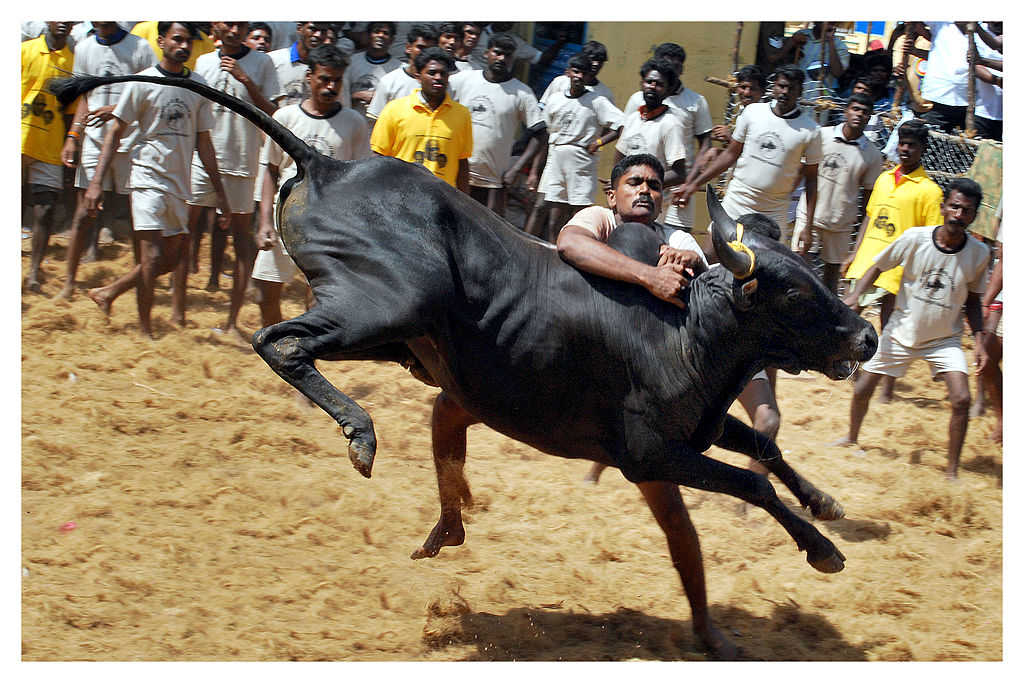As far as rituals and customs are concerned, the states of our vast nation are mini countries in themselves, each one has unique festivals and a distinct way of celebrating them. The traditions of the Indian states are so deep-rooted that it is impossible to pluck them out. So, when Jallikattu was ‘banned’ citing animal protection laws, a backlash was imminent. And the backlash was strong.
Jallikattu is a traditional event of Bull taming that’s exclusive to the southern state of Tamil Nadu. It is celebrated as a part of Pongal celebrations on Maatu Pongal day; the second day of the Tamil month Thai. Bulls that take part in Jallikattu are bred specifically.
Animal protection organizations like the FIAPO (Federation of India Animal Protection Agencies) and PETA India have been protesting the practice since 2004, but it was only last year that the rest of India got to know about it. And this year the resonances reached a deafening pitch.
The banning of Jallikattu will go down in History as a watershed moment. The ban took Jallikattu out of the limits of Tamil Nadu and made it a nationwide affair.
Folks in Tamil Nadu openly defied Judiciary by holding the event without fearing the police batons. Supporters of Jallikattu were taken into preventive custody near Madurai for trying to defy the ban on the sport. At Chennai’s Marina beach, college students formed a human chain demanding the ban on the sport be lifted.
Conventionally anti-Hindu Dravidian Parties backed their people strongly. Tamil Nadu Chief Minister O Panneerselvam declared that the event should be held this year. AIADMK General Secretary VK Sasikala also wrote a letter to Prime Minister Modi seeking announcement of an ordinance for conducting the sport. DMK’s working president MK Stalin also called for the ban to be lifted.
Superstar Rajinikanth extended his support for Jallikattu, in his words “Bring in whatever rules but jallikattu must be held to keep up the traditions of our Tamil culture.” Superstar Kamal Hassan too defended the game of jallikattu stating “If you want a ban on jallikattu, let’s also ban biryani, I’m a big fan of jallikattu. I’m probably one of few actors who’ve played jallikattu. Am a proud Tamilian, this is our culture”.
Possibly for the first time in the history of India, a regional festival got such fervent support on the social media. Pro-Jallikattu trends that dominated the social media, forced liberal columnists to pen long Op-eds about the traditional sport. Social Media also highlighted the duplicity of the so-called animal welfare organizations who go tight-lipped about mass scale slaughtering of animals during non-Hindu festivals but stage protests for purely sporting events such as Jallikattu.
The ban on the sport also made everyone aware about the way the Judiciary cherry picks its targets. Last year itself, we heard clamors about pollution caused by the Hindu festival of Diwali, inconvenience caused by Navaratri and Ganesh Utsav, and Judiciary actually intervened to shorten the heights of Dahi Handi Human Pyramids.
Last year all of us saw a weepy CJI TS Thakur grumbling about the shortage of staff and overload of work. But episodes like Dahi Handi and Jallikattu prove that Judiciary’s priority lists are either unsorted or agenda-driven.
Episodes such as this make us strong as a nation, make us realize who our hidden enemies are? The Judiciary might have muscled their way into banning the sport this year but they also managed to awaken the snoozing conscience of the stupid common Hindu.
While we must consciously say no to the dogma plaguing our Dharma, we must also be ready to put up a strong resistance against the assault on our customs, beliefs and philosophy.
